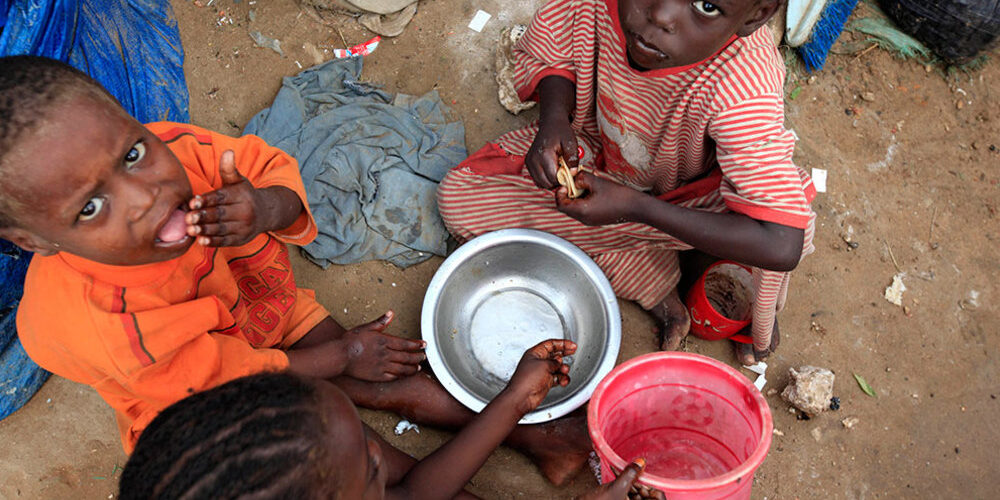Uncovering how poor diets and inequity are shaping the health of Ghana’s next generation.
In a country blessed with fertile soils and abundant harvests, too many children still go to bed hungry. Behind Ghana’s progress in reducing poverty lies a quieter, more painful reality — 2.4 million children live in food poverty, lacking the nourishment needed for healthy growth and learning.
In his inaugural lecture at the Ghana Academy of Arts and Sciences, Prof. Richmond Aryeetey described this as Ghana’s “hidden hunger”. Hidden hunger is a form of deprivation that doesn’t always show up as empty plates, but as stunted growth, low immunity, and unrealized potential.
“We often celebrate having enough food on the market,” he noted, “but we rarely ask whether our children are truly nourished.”
When Food is Not Enough
Food poverty goes beyond hunger. It means households cannot afford or access diverse, nutritious foods such as fruits, vegetables, dairy, eggs, and protein on a regular basis. Many families rely on cheap, energy-dense meals that fill stomachs but fail to provide essential nutrients.
Data from national assessments show that over 70% of Ghana’s children live in households that cannot afford a healthy diet. Meanwhile, malnutrition continues to cost the nation nearly US$3 billion each year, or 6.4% of GDP, through lost productivity, poor learning outcomes, and increased healthcare costs.
Children who are malnourished early in life face irreversible consequences: delayed development, weaker immune systems, and lower educational performance. The effects ripple far beyond childhood; influencing health, earnings, and national development for decades to come.
Inequity at the Table
The nutrition gap in Ghana reflects broader social inequities. In rural and low-income areas, healthy food options are often unavailable or unaffordable. Urban families may have more access, but rising food prices and the lure of cheap processed foods have made poor diets a nationwide challenge.
Prof. Aryeetey emphasized that “the problem is not only what people eat, but what they can afford to eat.”
The cost of a healthy diet in Ghana now exceeds ₵18 per person per day, and can rise to ₵24 in some regions. For families living on daily wages, nutritious eating is simply out of reach. This economic reality perpetuates the cycle of poor diets and undernutrition.
Feeding the Future
Solving Ghana’s hidden hunger requires more than food aid. It calls for systemic action that tackles affordability, access, and education.
Key priorities include:
-
Making healthy diets affordable through better pricing policies, food subsidies, and agricultural diversification.
-
Investing in school feeding programs that provide nutritious meals and teach healthy eating habits early.
-
Promoting nutrition education for parents, caregivers, and communities.
-
Strengthening data and accountability to monitor child nutrition outcomes and ensure equitable reach.
These efforts must go hand-in-hand with broader actions to stabilize food prices, improve market access, and empower smallholder farmers to produce diverse, nutrient-rich foods.
Beyond the Numbers
Behind every statistic on food poverty is a child who could have thrived with the right meal. Malnutrition is not just a health problem; it is a denial of opportunity, dignity, and equality.
“Every undernourished child represents a promise Ghana has yet to keep,” Prof. Aryeetey said. “A nation’s development depends on the nourishment of its youngest citizens.”
This “hidden hunger” does not make headlines as often as inflation or politics, yet its impact is deeper and longer-lasting. Ending it requires compassion, coordination, and courage from government leaders, farmers, parents, teachers, and communities alike.
A National Responsibility
The future of Ghana’s children cannot depend on chance or charity. It demands consistent investment, smart policies, and shared commitment across every region, home, and institution.
Healthy children are the foundation of a healthy nation. Every cedi spent on child nutrition today returns many times its value in human capital tomorrow.
We must all play our part by choosing and promoting nutritious foods, reducing waste, supporting local producers, and demanding policies that make good nutrition accessible to every family.
Call to Action
It’s time to make good nutrition a shared national goal.
Let’s ensure that every child in Ghana grows up well-fed, well-nourished, and full of potential.
Because feeding the future is not someone else’s duty — it’s all of ours.
–
Next in the Series →

A closer look at how Ghana can move from policy promises to sustained action in tackling food and nutrition challenges.




